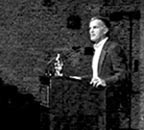In a speech that prompted heated debate, applause and shouting matches, Norman Finkelstein criticized Israel’s actions in the long history of the Arab-Israeli conflict, comparing those actions to the oppression of Native Americans by European colonists and to apartheid-era South Africa.
A crowd of about 150 students, faculty and community members gathered in Nunemaker Auditorium on Tuesday night to hear Finkelstein’s lecture titled “Whither the Peace Process: Prospects for Resolving the Israel-Palestine Conflict.”
Finkelstein is a Jewish man whose parents were survivors of the Warsaw Ghetto and Auschwitz. He is considered “one of the most radical and hard-hitting critics of the official Zionist version of the Arab-Israeli conflict,” according to Avi Shlaim of Oxford University as reported in a university news release.
He received his doctorate from Princeton University and is a professor of political science at DePaul University in Chicago.
Loyola professor of graphic design, Dana Bartlet, introduced Finkelstein.
Finkelstein began his lecture by outlining the background of the Arab-Israeli conflict and predicting an ominous future.
“Regrettably, we are heading into what will be a turning point in not only the Arab-Israeli conflict but also in U.S. relations with the Middle East,” he said.
When the Zionist movement began at the end of the 19th century, Palestine was “not an empty piece of real estate” and was 90 percent to 95 percent Gentile, according to Finkelstein.
In order to fix this problem, the Zionist movement had two options. He cited historian Benny Morris, whom he called “a thug,” with the first option, “the way of South Africa” meaning an apartheid state where a settler minority rules over the indigenous majority.
The other option was transfer. Finkelstein said he conducted an extensive comparison between the treatment of Palestinians and the forced displacement of the Cherokee people in North America.
Finkelstein said that at that time, displacement of indigenous population was considered an extreme, but acceptable means to solving conflict. He said there was talk about living peacefully with the indigenous people, but it was only rhetoric.
He said sensible people should know that the resistance of the indigenous people to the Zionist movement had nothing to do with anti-Semitism, only resistance to their expulsion. According to Finkelstein, to invoke anti-Semitism to try to explain this resistance is as irrational as invoking “Anti-White-ism” to explain why the indigenous people of North America would resist European settlers.
He said the majority of public opinion favored the Zionist enterprise because Americans saw what the Zionists were doing as somewhat mimicking what the European settlers did in North America.
Finkelstein cited statistics that show about 80 percent or 750,000 Palestinians were expelled in the course of the first Arab-Israeli war in 1948. But he said international law today prevents Israel from displacing people as it did in the past.
Israel has had many opportunities to accept a “two-state” peace agreement, but has either refused or made it impossible for Palestinians to adopt, he said.
According to Finkelstein, since Sept. 11, there has been a loosening of international law.
Even the U.S. could be guilty of this with all the talk of a preemptive strike on Iraq, because preemptive strikes are illegal under international law.
“The United States is out of control,” he said. “What is regime change except overthrowing a recognized government?”
Finkelstein predicted that Israel would strike Palestinians hard when journalists shift their focuses to Iraq.
“This is the one time I really hope that I’ll be proven a fool,” he said.
Finkelstein’s comments were met with loud applause on several occasions. When the question and answer period began, however, the atmosphere became heated.
“The facts you presented today are in my opinion irrational, prejudicial and contrary arguments,” Alex Solsa, Tulane senior, said. “I feel your presentation is self-serving to sell books. The most scary thing about this is that you’re a professor. I feel dirty sitting here tonight.”
Tensions in the auditorium continued to rise as some people spoke out, questioning Finkelstein’s sources and facts.
“Has that happened? Did I invent it? Is it a product of my imagination?” he shouted. “Isn’t it morally responsible to make it known to the American people that there might be possible ethnic cleansing, made possible by U.S. support?”
Shouting and debate in raised voices continued for about 45 minutes after the lecture ended. Things settled down as opponents left after voicing their opinions.
Finkelstein concluded with a personal story about giving lectures with his mother to Jewish communities in New York. She would talk about Nazis and Jews while he talked about Israelis and Palestinians. When someone questioned his mother about what he lectured about, she paused and asked whether or not it was a crime for a Palestinian to be born in Palestine.
After the nearly two and a half hour lecture ended, there was a reception held in the Danna Center.
There, people could purchase both of Finkelstein’s books and T-shirts saying “Free Palestine.”
There was a mixed response to the lecture.
“I think that he, being a Jew from a survivor family, was very brave to give that speech to what was obviously a predominately Jewish audience,” Ashley Powers, history sophomore said. “I’m a Jew and agree wholeheartedly with what he said.”
Others felt the title of the lecture and advertisements for it were misleading.
“He did not talk about the peace process. I agree with what he was saying, but it wasn’t fruitful at all,” Stephanie Margherio, English junior said. “I expected more out about the peace process and less indulging in banter with sensationalist ideas.”
With additional reporting by Vitaliy Voznyak and Kate Perkins.







